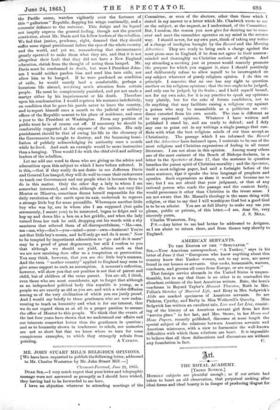MR. JOHN STUART MILL'S RELIGIOUS OPINIONS. [We have been requested
to publish the following letter, addressed to Mr. Charles Westerton by Mr. John Stuart Mill :—] Clermont-Ferrand, June 21, 1866.
DEAR Se-a,—I very much regret that your letter and telegraphic message were not answered as promptly as I should have wished, they having had to be forwarded to me here.
I have no objection whatever to attending meetings of the
Committee, or even of the electors, other than those which I stated in my answer to a letter which Mr. Chadwick wrote to me on the subject, at the request, as I understood, of the Committee. But, I confess, the reason you now give for desiring me to come over and meet the committee operates on my mind in the reverse way. I should never, for my own part, think of taking any notice of a charge of irreligion brought by the Record and the Morning Advertiser. They are ready to bring such a charge against the most pious man in England, if he does not agree in their narrow- minded and thoroughly un•Christian notions of religion. And my attending a meeting just at present would scarcely promote the purpose for which you suggest it, since I should positively and deliberately refuse to allow myself to be interrogated on any subject whatever of purely religious opinion. I do this on principle. I conceive that no one has any right to question another on his religious opinions ; that the tree ought to be judged, and only can be judged, by its fruits ; and I hold myself bound, not for my own sake, for it is my practice to speak my opinions very plainly, but for the sake of future candidates, not to do anything that may facilitate raising a religious cry against a person who may be unassailable as a politician on evi- dence extorted from his own mouth. The case is different as to my expressed opinions. Whatever I have written and published I stand by, and am ready to defend ; and I defy any one to point out in my writings a single passage that con- flicts with what the best religious minds of our time accept as Christianity. The passage which I am informed the Record and the Advertiser have fastened upon, I maintain to be one of the most religious and Christian expressions of feeling in all recent literature. I am not alone in this opinion. Among many others one of the most eminent of the Bench of Bishops declares, in a letter in the Spectator of June 17, that the sentence in question breathes the purest spirit of Christian morality ; and the Spectator, itself a most religious paper, had said a fortnight before of the same sentence, that it speaks the true language of prophets and apostles. Such expressions as these it would not become me to use ; but I am not afraid that your judgment, or that of any rational person who reads the passage and the context fairly, would pronounce it other than Christian in the truest sense. I am not aware that Mr. Mainers theology is the same thing with religion, or that to say that I will worship no God but a good God is to be an atheist. You are at full liberty to make any use you please, public or private, of this letter.—I am, dear Sir, very
sincerely yours, J. S. MILL. Charles Westerton, Esq.
P.S.—Any letter to me had better be addressed to Avignon, as I am about to return there, and from thence very shortly to England.






























 Previous page
Previous page